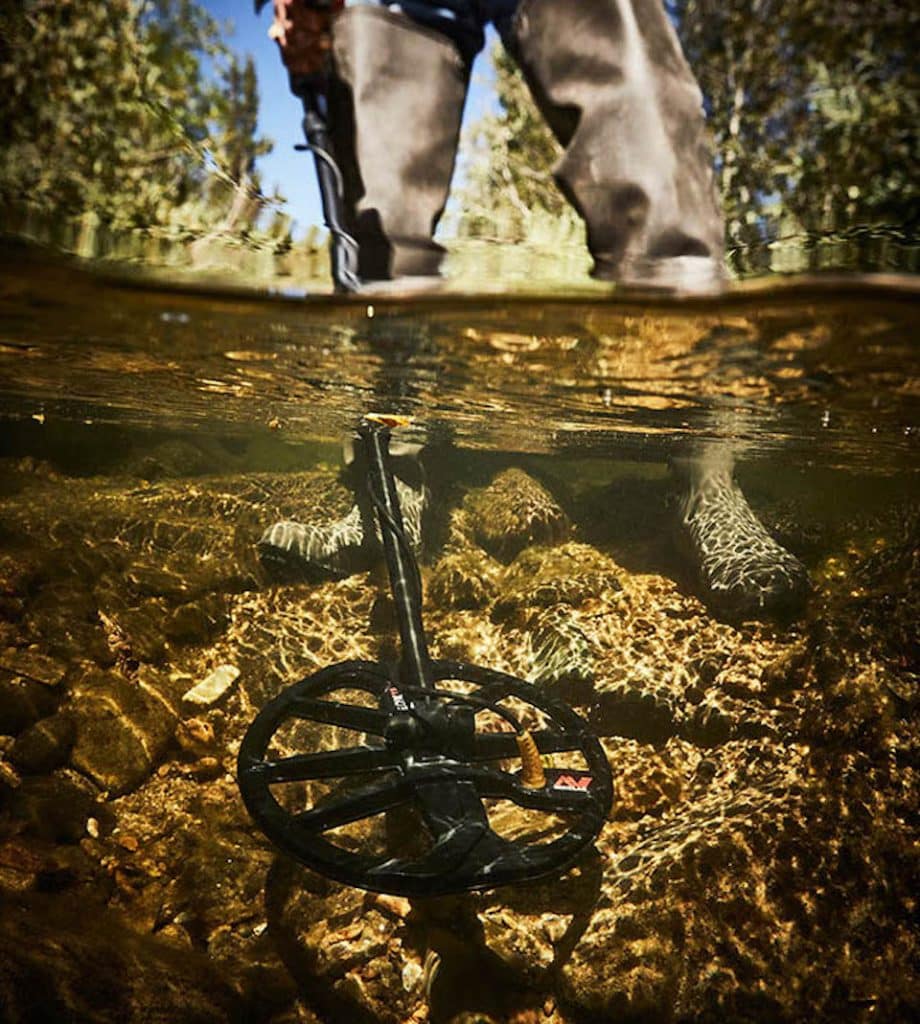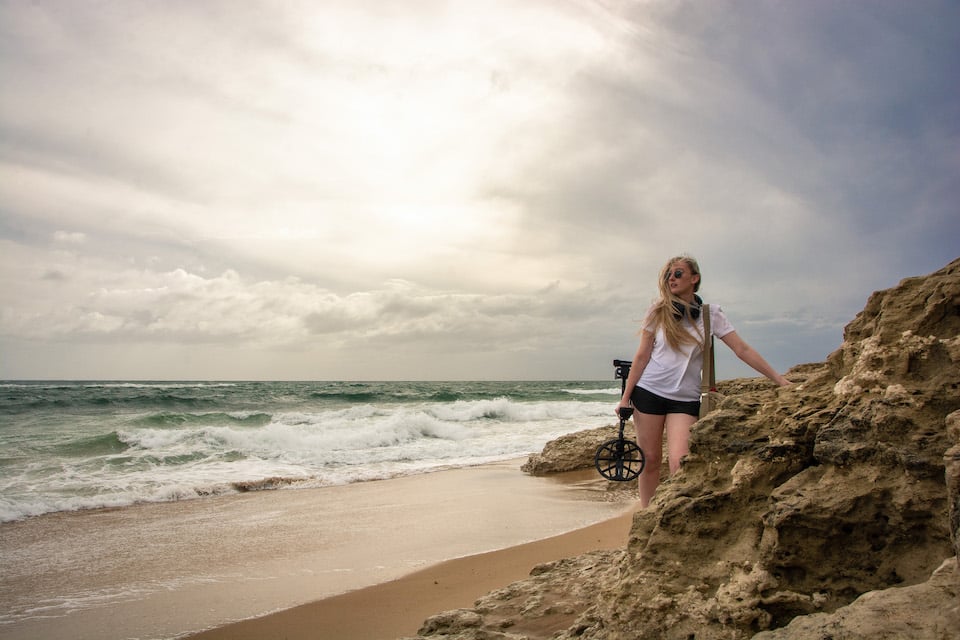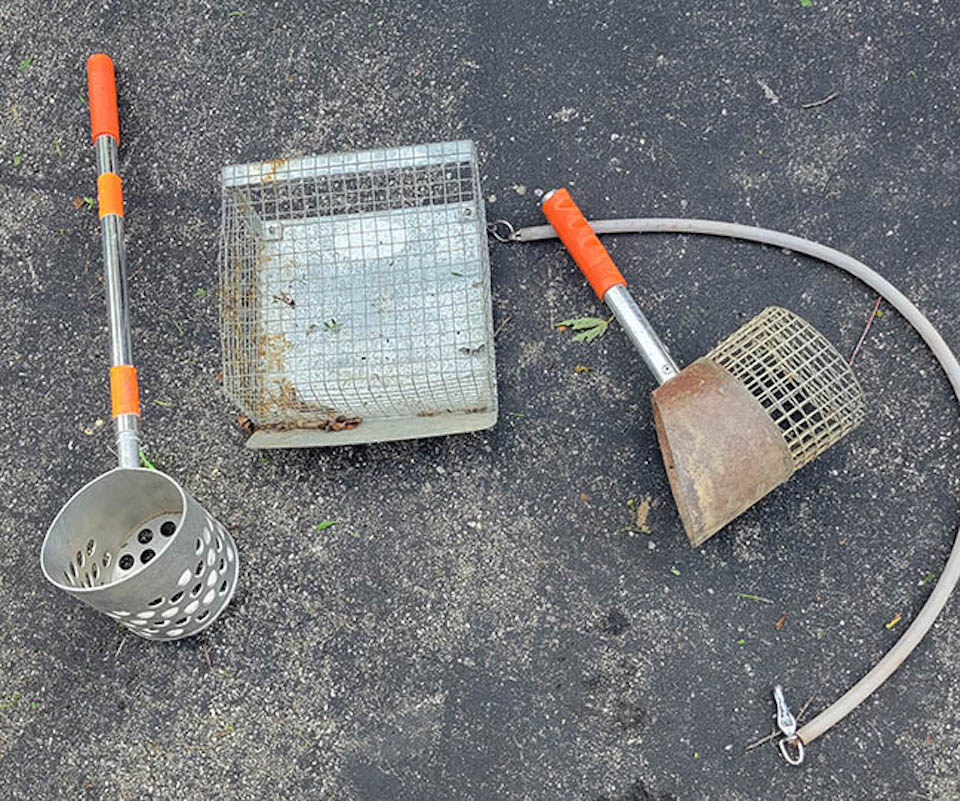Chicago, IL (July 13, 2023) – Metal detecting in water adds an element of excitement which is not usually a part of searching on land. Walking through the water means moving slower. Swinging the machine also slows down your movement. The water keeps the hunter from seeing what they are searching for – in most cases – due to depth and clarity. Plus, when water detecting, the chances of finding gold or silver, in the form of jewelry, is greater. So, when the machine sounds off, that excitement is a notch or two higher.

Like detecting on land, the user must pinpoint the target before recovery. Then a scoop of some kind is placed slightly behind where the target is thought to be. Your machine may tell you the probable depth of the possible treasure and the scoop is moved forward through the sand, mud, or whatever material you are hunting. Raising the scoop will begin the process of separating the target from the surrounding material. Sand will quickly fall through the holes in the scoop. Usually, a few shakes through the water will eliminate almost everything except the larger items like shells and rocks, and hopefully, the hiding treasure. Finally, you get to raise the scoop from the water and peer inside. The long lost, heavy, gold ring should be gleaming in the bottom. A wire mesh basket, which can be worn around the waist, allows the user to drop the keepers into the basket and be ready for the next recovery.
Metal detecting is a hobby that can be enjoyed by almost anyone. Kids as young as four or five can handle a lightweight detector and seniors in their 90’s are still out competing with younger folks for lost treasure. The hardest part about finding great items with a detector is getting to the right spot before someone else does.
When using a metal detector, you have three choices of where to hunt. Most people begin searching in the dirt, whether it be yards, parks, fields, etc. Others, usually after they have been detecting for a while, begin searching in the water. This area eliminates a lot of the competition as only a few enjoy water hunting. Of course, some detectorists hunt both land and the water. For those who detect the water, there are two choices, deep water or shallow. This choice determines what type of equipment you need, and of course, the final price of said equipment.

Shallow water detecting is the least expensive of the two water choices, and the equipment used can be utilized on land. The detector must have a waterproof coil (most modern detectors have this), and these machines can be submerged up to the control box. This means, if you don’t drop it in the water, you can usually search in knee deep water. The Minelab VANQUISH series (340, 440, and 540) fit in this category. All are equipped with Multi-IQ technology, which allows the machine to be used to find all metals, in all substrates, all the time. This includes saltwater, which is often a problem with other detectors.
If you plan on searching in deeper water, probably much over knee deep, a totally waterproof detector such as the Minelab EQUINOX series (600, 700, 800 and 900) machines is required. These detectors can be totally submerged (up to 10 or 16 feet, depending on the model) and like the VANQUISH series, contain the Multi-IQ technology for all around detecting.
Now that you have a detector, sand scoop, and recovery basket, a good location to search must be found. If you live near a beach, this is a great choice. Large beaches, which attract many people are the best. Lots of people mean many lost items in the water. People wear their rings into the water and their fingers shrink and get lubricated. They throw a ball or Frisbee, and the ring flies off. Teenagers’ horseplay and a delicate necklace gets broken and falls to the sand. Recovery is almost impossible without a detector.

Large beaches are not the only choice. If you go camping, many campgrounds have a small swimming pond or lake. Before booking your visit, ask if they have one and would you be allowed to detect there. If the answer is “No”, call another campground. If there is a marina nearby, or even a small fishing lake, which has a few piers for boat docking, many items are lost along the sides of the pier when people bend over to place items in the boat or climb in. Watch to see where fishermen wade in the water to fish. Anything they drop while fishing is probably going to remain on the bottom of the creek or river.
Talk to older relatives or neighbors and ask if they recall any old swimming holes they used frequently when they were young. Your church, nursing homes and other places are filled with older folks who are usually anxious to share. They have years of memories which could lead you to great detecting spots. The library has old copies of the local newspaper. Research the early twentieth century papers, (usually on microfilm) for swimming parties, which were held a century ago.
Hopefully, you will find several places to begin metal detecting in water. If you find some items on a modern beach, remember treasures are lost every day as people return to the water. As the shoreline changes, the present day beach may have moved a hundred yards or more from the old site. A little research can lead you to the older area, which might never have seen a metal detector.
The Women's Outdoor News, aka The WON, features news, reviews and stories about women who are shooting, hunting, fishing and actively engaging in outdoor adventure. This publication is for women, by women. View all posts by The WON